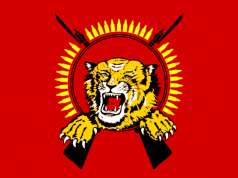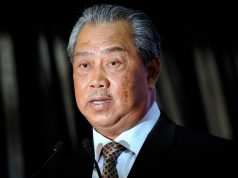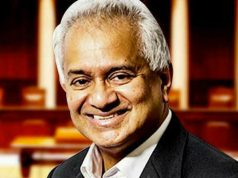

Representatives from the European Council, European Commission, Netherlands and Britain all defended the inclusion of the LTTE on the EU’s terrorism list.
A Sri Lankan government delegation also observed the proceedings, and the court room was packed with over a hundred diaspora Tamils.
Victor Koppe, the Amsterdam-based attorney for the applicant, told the court that, “There can be hardly any doubt that the LTTE was fighting a legitimate struggle against an extremely oppressive regime which some have even labelled as genocidal.”
Koppe compared Sri Lankan President Mahinda Rajapaka with Syrian leader Bashar Al-Assad, before reminding the court about Britain’s chequered stance on terrorism: “the same government that stands before you today was once quite keen on labelling Mandela a terrorist and not a legitimate fighter against an oppressive regime.” The UK delegation said it noted Koppe’s comments on British foreign policy but said it was outside the scope of this hearing for the UK to respond.
Koppe concluded that “the refusal to delist the LTTE prevents the Tamil diaspora from organising itself into an effective partner in the defence of Tamil rights through political means.”
Koppe’s argument hinged on four key points. Firstly, that the LTTE were combatants in an armed conflict and as such should have been governed by international humanitarian law not anti-terrorism mechanisms. Next, Koppe’s team took issue with the authenticity of sources used by the Council to justify its ban on the LTTE, which included Wikipedia pages. Thirdly, the Council’s reliance on India and Britain’s decision to ban the LTTE was questioned. Lastly, Koppe argued that the factual situation had changed following the military defeat of the LTTE in 2009 and the absence of any attacks for almost five years.
The Dutch government delegation said parties to an armed conflict were still governed by other laws, citing this in defence of the conviction of five Tamils in the Hague in 2011 for LTTE fundraising, and adding that senior judges in Germany and France had reached similar conclusions.
The European Commission said that the LTTE did not pose a terrorism risk in the future provided the asset freeze remained in place. Otherwise, there was a likelihood that the LTTE would resume fighting when they recovered the capability.
The UK said it was legitimate for their Home Secretary, rather than an independent judge, to have banned the LTTE in 2000. Furthermore, evidence could be withheld from Parliament when passing anti-terror legislation. The four-strong UK delegation refused to comment when TamilNet approached them after the hearing.
Judges spent two hours questioning the parties, directing the majority at the European Council. The judges said there was no evidence that the Council had checked the fundamental rights situation in India before making the contested decision in 2006 to ban the LTTE. The court doubted whether there was due process in India to challenge a ban on the LTTE there, in which case any judgement was not compatible with EU standards. European Council countered that the ban would have passed based on the UK position alone, regardless of the ban in India.
The judges were also dissatisfied that the Council’s evidence for a terror ban on the LTTE included a list “contextual material based on well publicised events”, some of which were internet references and Wikipedia pages about terrorist acts allegedly committed by the LTTE.
The advocate for the European Commission mentioned in passing during his closing remarks that a colleague had nearly been killed by the LTTE.
-Tamil Net










